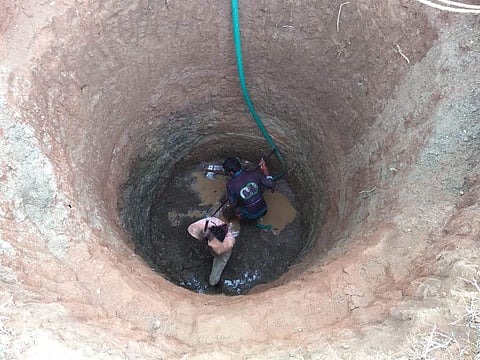

Being a resident of Bengaluru, I have often seen the big wells that complement old heritage houses and wondered who built them. Were they formed naturally? Is the water in them usable? To get all my questions answered, I got in touch with Ravi K who hails from Bhovi community in Karnataka — known best for their stone-cutting and well-digging skills. Ravi says, "Back in those days, people would either fetch water from nearby lakes, rivers or the well in their house. Today, the circumstances have changed as people get water directly in their kitchen or bathroom taps. The open or closed wells that we get to see today were dug by people who belonged to my community called Bhovis or Manu Vaddars. Of course, the water was naturally found underground but we dug that area and built the structure so that people could fetch water and use it."
Currently 25-year-old, Ravi learnt the skills of well-digging from his father and grandfather when he was only 12 years old. He narrates, "I have grown up seeing Bhovi people dig well across Bengaluru. It came naturally to me when it was my turn to do the job. The first well that I dug was in Jayanagar and it was 13 years ago. It had taken two days time for me to completely source groundwater. When I completed digging the well, the owner of the house and I were both happy. I don't remember how much he had paid then but I gave my first earnings to my father."
There was no looking back for Ravi from then on. He would accompany his father and family friends to different areas in the city. He boasts, "I have dug more than 50,000 wells so far," but humbly adds, "But the journey of any well-digger is not easy. We face several challenges and put our lives at risk everytime we dig deep into the earth to create a well. Sometimes, we find water at the depth of just five to seven feet, but there are times when we don't find water at all, no matter how deep we go. Deeper than thirty feet, the level of oxygen decreases. When mud from above falls on us, it goes into our ears and eyes. That's why there is always a person who stands up top and watches over things. This job requires presence of mind. It takes a minimum of two to three days to dig a well and the digger resurfaces only once a day. But in the end, it all depends on the experience of the person digging."
If you think, considering we live in the age of tech, that they use machinery to help them dig, then you're wrong. It's all done manually using their traditional instruments, the gadapa and chanake. They also use thick ropes and huge tubs. He explains, "We dig the earth and excavate the soil to the desired depth. Once we see water seepage or flow, we dig deeper. The hole that we dig is six to eight centimetres wide and we lay cement rings around the newly dug area. Smaller jelly stones are also used to fill the gaps. Following this, around cement structure is built around the well and the opening is covered by a sheet of mesh or an iron grill."
Considering all the advancement, we ask Ravi how often they are actually called to dig and what the monthly wages are like. He replies, "There is no particular amount that we earn every month. These days, very few people call us to dig wells and many of them don't even know that our community exists. We work with several NGOs and organisations and they pass on our phone numbers to people who need a well to be dug. These days, we've also taken on construction work of structures for rainwater harvesting, restoring old wells, plumbing, fixing leakages and other odd jobs. With all this, we can bring home about `15,000 a month." Ravi adds that they go door to door asking if people are interested in setting up rainwater harvesting or wells is their houses.
Ravi is newly married and hopes that he too has a bright future ahead. "I am happy that I belong to the Bhovi community who are recognised as the saviours or warriors of water. The awareness among people to save water for the future generation can fetch us more work," says Ravi who wants to earn a decent income and secure the future of his family's next generation.
